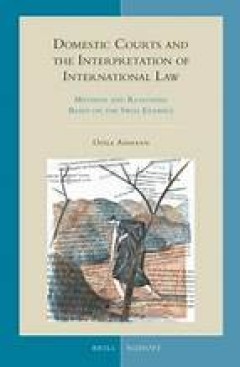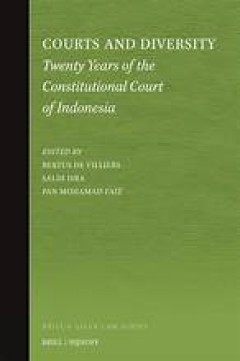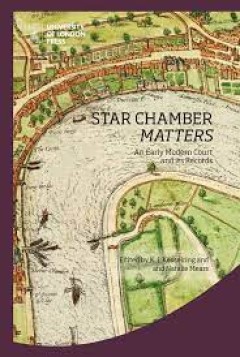Filter by

Domestic Courts and the Interpretation of International Law
In Domestic Courts and the Interpretation of International Law, Odile Ammann examines how domestic judges do and must interpret international law. She analyzes their interpretative methodology and the predictability, clarity, and consistency of their reasoning. Highlighting the main gaps in contemporary international legal scholarship regarding international law in domestic courts, Ammann offer…
- Edition
- -
- ISBN/ISSN
- 978-90-04-40987-3
- Collation
- oer.unej.ac.id
- Series Title
- Developments in International Law, Volume: 72
- Call Number
- -

Courts and Diversity
The Constitutional Court of Indonesia functions in one of the most diverse societies in the world. It is required to resolve disputes within a kaleidoscope of diversity and plurality with flexibility, pragmatism, asymmetry, and wisdom. Whilst national minimum norms are important for nation-building, recognition of local customs, diversities and indigenous systems are equally important to protec…
- Edition
- -
- ISBN/ISSN
- 978-90-04-69169-8
- Collation
- oer.unej.ac.id
- Series Title
- Brill's Asian Law Series, Volume: 12
- Call Number
- -

Courts and Diversity
The Constitutional Court of Indonesia functions in one of the most diverse societies in the world. It is required to resolve disputes within a kaleidoscope of diversity and plurality with flexibility, pragmatism, asymmetry, and wisdom. Whilst national minimum norms are important for nation-building, recognition of local customs, diversities and indigenous systems are equally important to protec…
- Edition
- -
- ISBN/ISSN
- 978-90-04-69168-1
- Collation
- oer.unej.ac.id
- Series Title
- Brill's Asian Law Series, Volume: 12
- Call Number
- -

International Court of Justice and municipal courts: an inter-judicial dialogue
Municipal courts' decisions in the jurisprudence of the International Court of Justice -- Enforcement of ICJ decisions in municipal courts -- Reception of decisions of the ICJ by municipal courts.
- Edition
- -
- ISBN/ISSN
- 9781032006901
- Collation
- -
- Series Title
- -
- Call Number
- -

Persuasion and legal reasoning in the ECtHR Rulings: balancing impossible dem…
Introduction 1 Challenges of judicial reasoning in beginning and end-of-life cases 2 Ways of judicial reasoning ⁰́₃ outline 3 Ways of reasoning in medically assisted procreation and surrogacy cases 4 Ways of reasoning in abortion cases 5 Ways of reasoning in end-of
- Edition
- -
- ISBN/ISSN
- 9781003375999
- Collation
- -
- Series Title
- -
- Call Number
- -

National Courts and Preliminary References to the Court of Justice
This book has attempted to answer four questions relating to the different phases in the interaction between national courts and the ECJ in the context of the preliminary ruling procedure: question, answer and follow-up. The fourth question concerned the relationship between the answer (ie, the satisfaction of national judges with their interaction with the ECJ and the answers) and the question…
- Edition
- -
- ISBN/ISSN
- 9781800374164
- Collation
- -
- Series Title
- -
- Call Number
- -

Star Chamber Matters An Early Modern Court and Its Records
An extraordinary court with late medieval roots in the activities of the king’s council, Star Chamber came into its own over the sixteenth and early seventeenth centuries, before being abolished in 1641 by members of parliament for what they deemed egregious abuses of royal power. Before its demise, the court heard a wide range of disputes in cases framed as fraud, libel, riot, and more. In s…
- Edition
- -
- ISBN/ISSN
- 9781912702909
- Collation
- -
- Series Title
- -
- Call Number
- -

Hearts and Minds : Canadian Romance at the Dawn of the Modern Era, 1900-1930
What was romance like for Canadians a century ago? What qualities did marriageable men and women look for in prospective mates? How did they find suitable partners in difficult circumstances such as frontier isolation and parental disapproval, and, when they did, how did courtship proceed in the immediate post-Victorian era, when traditional romantic ideals and etiquette were colliding with the…
- Edition
- -
- ISBN/ISSN
- 978-1-55238-582-1
- Collation
- -
- Series Title
- -
- Call Number
- 392.409 710 904 1 AZO h

Hearts and minds : Canadian romance at the dawn of the modern era, 1900-1930
What was romance like for Canadians a century ago? What qualities did marriageable men and women look for in prospective mates? How did they find suitable partners in difficult circumstances such as frontier isolation and parental disapproval, and, when they did, how did courtship proceed in the immediate post-Victorian era, when traditional romantic ideals and etiquette were colliding with the…
- Edition
- -
- ISBN/ISSN
- 978-1-55238-521-0
- Collation
- -
- Series Title
- -
- Call Number
- 392.409 710 904 1 AZO h

Governing Delinquency Through Freedom : Control, Rehabilitation and Desistance
This book analyses the non-custodial government of young offenders in two major cities in Brazil. In doing so, it delves into the paradox of an institution exerting control over youths while at the same time promoting their autonomy and responsibility. The study sheds light on the specific logics of power, control, and inequality produced by such institutional settings.The book’s analysis is …
- Edition
- -
- ISBN/ISSN
- 978-0-429-46617-5
- Collation
- -
- Series Title
- -
- Call Number
- 362.7 BUG g
 Computer Science, Information & General Works
Computer Science, Information & General Works  Philosophy & Psychology
Philosophy & Psychology  Religion
Religion  Social Sciences
Social Sciences  Language
Language  Pure Science
Pure Science  Applied Sciences
Applied Sciences  Art & Recreation
Art & Recreation  Literature
Literature  History & Geography
History & Geography